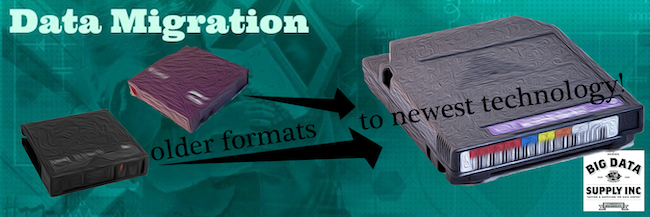We couldn't help but share the wise words of journalist Bryan Betts, "Tape Never Died, It Was Just Resting." This is without a doubt a true tale.
Back in the day, tape drives were a staple in most organizations and in homes. Smaller formats included DAT and QIC for backups.
According to Betts, one of the major reasons tape began to fail was that it simply wasn't advancing quickly enough. Hard-disks were providing huge amounts of capacity and were pretty affordable. Plus, deduplication came to market, which resulted in organizations backing up largely to tape.
And then, the day came in which tape became quite expensive and data sizes grew by leaps and bounds. Plus, it was discovered that tape could be hacked and data wiped before one could blink an eye.
The answer to such issues has been to use tape alongside disk. Today, organizations realize that disk is excellent for quick storage and information retrieval, while tape is perfect for storing massive amounts of data for long periods of time.
For example, LTO-6 can hold 6TB or more of compressed data.
"Tape is highly performant and scalable," says Steve Mackey, vice-president of Spectra Logic. "I think everyone is used to the idea now that tape has its use cases."
Another reason tape isn't dead is that it has improved 700 percent in the last 10, plus years. This means that it is even more reliable than disk.
This doesn't mean that there isn't a distinct place for disk, rather it means that tape is the perfect partner for it. Where disk falls short, tape steps right in and makes a data security environment extra safe.
At Big Data Supply, we work each and every day with organizations that rely on tape. We are here to answer any questions or concerns that you may have about your data storage infrastructure.
Feel free to contact us and we'll get you sorted! We buy and sell new and used tape, disk array, and other equipment.
Drop us an e-mail or give us a call for more information!

If you are considering the migration of data, you may have already realized the process is much more complex than you could have ever imagined. Don’t get down on yourself in case you get overwhelmed, as the effective handling of important data (and the many forms it comes in) is no laughing matter.
To help you take the right data migration steps, we hope the following tips will help:
• Find the right experts and partners. It is an excellent idea to develop a team that fully understands the data migration process and can walk you through the process. This includes getting the right people within your organization involved (i.e. technology specialists, data maintainers/managers, marketing teams, organizational leaders, and more) and seeking out a data migration expert for help and advice.
The earlier you take this step, the less likely you will make costly and time-consuming mistakes.
At Big Data Supply, we offer comprehensive data migration services for organizations of all sizes. We invite you to call our offices to discuss your needs.
• Get to know your data. It is very likely that you have a variety of data types/forms. The more you understand your data and its exact purpose, the more effectively you can develop a winning plan to meet your organization’s true needs. This will also save valuable time during the data migration process.
• Define your budget. Make sure you know exactly how much you can spend and what your return on investment will be as result of data migration. Without a clear understanding of your budget, you will be amazed at how much money you’ll burn through in a short amount of time.
When working with a data migration expert, it is best to be honest about your budget. This will allow for the suggestion of the very best methods and technologies to serve your interests.
• Develop a clear and concise plan. It is essential that you move into a data migration effort with a defined roadmap. This will reduce the work developers need to accomplish, while saving you both time and money.
• Think about the future. Make sure you build out a data management system that will last for years to come and can be expanded to meet your future needs. It’s no secret that technology is continually evolving – so create a flexible system that takes many different scenarios into mind. Refer to your experts for best practices, while sharing with them how you expect the business to change and grow.
• Get rid of unnecessary data. Once you become familiar with the multitude of data that has been collected over the years, you will be amazed at how much isn’t ever used or needed on a daily basis. Get rid of as much data as possible and/or figure out an inexpensive way to store legacy data (LTO tape may be an excellent option).
The secret to your success is careful planning and assuring you have the very best resources to migrate your data. Dare to find the very best ways possible to make your data work for you. Please feel free to connect with the Big Data Supply team for expert advice!